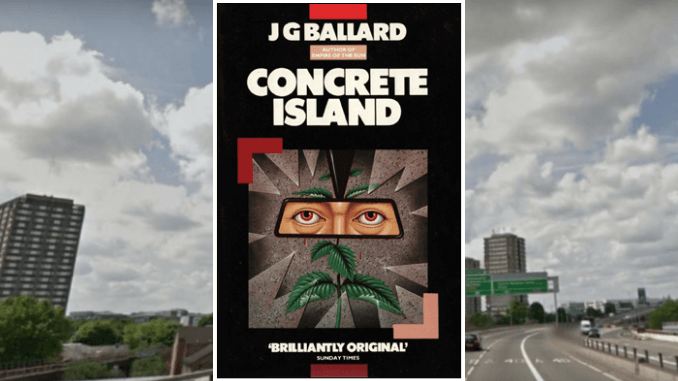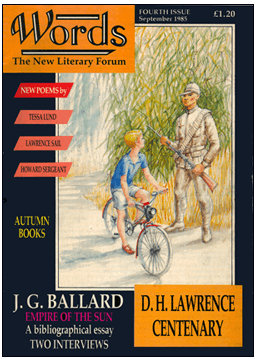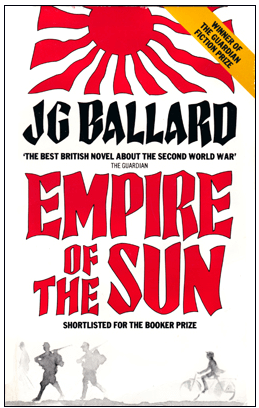

I wrote this review of Concrete Island, by J. G. Ballard back in 1988. Three years before that I had read a review of Empire of the Sun in a newly launched and short-lived literary magazine called Words, which folded a few months later (just after I had paid for a year’s subscription).
James Graham Ballard was born in Shanghai November 18, 1930. When he was eleven years old he watched the Japanese takeover of Shanghai. He was sent to a civilian detention camp where he spent the rest of the war. His experiences are described in the semi-autobiographical novel, Empire of the Sun, published in 1984 and turned into a film by Stephen Spielberg in 1987. Ballard wrote about the film for the Guardian.

I read Empire of the Sun in 1986 and it made a big impression on me at the time. For one thing, I appreciated Ballard’s candid acknowledgement of his boyish fascination with the Japanese, and later on, American, military, “my 13-year-old’s infatuation with the war, and the sudden irruption into our lives of American air power,” as he calls it in the Guardian article.
A few months later I read Concrete Island and I was intrigued by the imagery that cropped up in both novels, as I mention in this review.
So here it is more or less as I wrote it, over 30 years ago now…
A Review of J. G. Ballard’s Concrete Island
I believe in the power of the imagination
What I Believe – J. G. Ballard
to remake the world, to release the truth
within us, to hold back the night, to
transcend death, to charm motorways,
to integrate ourselves with birds, to
enlist the confidences of madmen.
The concrete island onto which Maitland crashes is the objective-corellative of his psyche – of the isolation of the human spirit, the alienation inherent in bourgeois society. “I am the island,” he cries at the end of the ninth chapter, confirming that the need to explore and identify this terrain is as important as the apparant need to escape from it:
“As he was already well aware, it was this will to survive, to dominate the island and harness its limited resources, that now seemed a more important goal than escaping.”
Concrete Island, p.47
He later remembers:
“…his refusal to walk through the overpass tunnel to the emergency telephone, his childish insistence that a rush hour driver stop for him, the anger that had poured out…”
ibid, p.83
He prefers rather to confront the rush hour traffic, suffer injury, and so render himself incapable of reclimbing the embankment. Once on the island the urge to escape, to attract attention sets him on his quest of exploring, coming to terms with, and mastering the island. Mastery of the island will enable him to escape – and simultaneously render escape irrelevant.
Here, then, is the predominate theme – the testing of the boundaries of the human spirit in the struggle to master an alien environment. The protagonist, whether Maitland in Concrete Island or Jim in Empire of the Sun, attains the mastery necessary to survive, and because that mastery is as much related to the landscape of the interior as the the exterior, the hostile environment becomes the hearth and home of the soul; the soul and its environment adapt to each other, and in shedding the flesh of the previous bourgeois existence, a leaner, self-sufficient being emerges. The change in environment changes the consciousness of the person thrown into it. For Maitland:
“…his body was more and more beginning to resemble that of his younger self.”
ibid, P.22
A retreat back to a younger, pristine self, a remythologising of his childhood is, for Maitland, a compelling image:
“The image in his mind of a small boy playing endlessly by himself in a long suburban garden surrounded by a high fence seemed strangely comforting.”
ibid, p.22
He has in the concrete island rediscovered the “garden surrounded by a high fence,” an untended, neglected wilderness, lacking the security of his childhood memory. Here again Concrete Island and Empire of the Sun resemble one another, for in both the absence of parent figures, and of the props of civilized society means the individual must rely on himself to survive. In both narratives surrogates are unearthed – Maitland discovers a discarded set of letterpress blocks:
“Maitland picked one up and examined the cloudy figures of a dark-suited man and a white haired woman. As he listened to the rain he thought of his parents’ divorce…”
ibid, p.48
And, more pointedly, the idea develops in the later text:
“The blurred image of a man and a woman standing arm-in-arm reminded Jim of his parents. This unknown English couple, perhaps dead in an air- raid, had almost become his mother and father.”
ibid, p.175
But the practicalities of mastering the island require more than a childlike simplicity; a putting away of childish things, and a discovery of uncharted aspects of Maitland’s character. For the island is occupied by a latterday Caliban – a one-time acrobat, made redundant through injury – and a prostitute seeking refuge from a broken relationship. Thus each is a casualty in his own right, and representative of the casualties of modern society.
Both Proctor, who’s realm the island is, and Jane, are necessary to Maitland’s survival, and while still weak from injury and hunger, he seeks to control them first by playing one against the other – winning Procter’s devotion through gifts, pieces of the car, burgundy and so on. Through these bribes Maitland persuades Procter to lead him to the secret food source – a nearby garbage dump. The security of this knowledge enables Maitland to challenge,
“that conspiracy of the grotesque which had kept him marooned on the island,”
ibid, p.87
The conspiracy is Jane’s hold over Procter; Procter’s realm is the island, but he is little more than an absurdly acrobatic puppet.
Maitland’s challenge involves the humiliation of Procter in front of Jane, who does nothing to intervene, and the threat of physical force (aided albeit by his crutch) against Jane herself, backed up by use of her own guilt against her:
“He relished the violent confrontation, knowing he would make both of them submit to him.”
ibid, p.98
He discovers two things; his capacity for calculated violence to achieve his ends, and the satisfaction this abuse provides the abused:
Determined to survive above all else, he would exploit this strain of cruelty in himself in the same way that earlier he had exploited his self pity and contempt. All that mattered was that he dominate the senile tramp and this wayward young woman.
Again we see the battlefront of experience altering perceptions of reality – the supposed desire, duty even, to escape is not even alluded to.
Behind Maitland and Jane’s power play lies “a recognition of their need to avoid any hint of commitment to each other,” (p.100). A commitment that is evidenced by the power play and consummated behind the charade of a cash transaction demanded and afterwards recinded by Jane.
Proctor is hired as Maitland’s mule, carrying him about his new domain. Again enacting his desire to escape, Maitland teaches Proctor to write large the words “Maitland help”, informing Proctor that they spell his own name. Proctor fails in his duty, but fascinated with his new skill Proctor inscribes much of the island with jumbled up versions of Maitland’s name, ironically ‘naming the island’ after his new master.
Proctor’s garbled writing, like his erratic gymnastics represent the last flickerings of a withdrawn spirit. Part cripple, illiterate, half blind, destitute, afflicted, tormented, Proctor lives only to please and to serve. It is his final attempt to both serve and please Maitland that causes Proctor’s death. It is an act of supreme servitude, beyond even giving up his own mattress and blankets for Maitland’s ‘pavillion’ which Proctor also built expecting reward and receiving only a few shattered fragments of an empty wine bottle:
“Proctor moved from one fragment to the next, licking the pieces with his scarred lips.”
ibid, p.119
Proctor must partake of the crumbs which fall from his master’s table, a master who now:
Like a mendicant desert chief presiding over his baren kingdom, squatted on the bed in the mouth of the rusty pavillion.
A measure of his control over himself and his environment is his reaction when for a second time he sees “the familiar white-haired figure of the old man with the light motorcycle”:
“He remembered his previous state of terror on first seeing the old man. This time, by contrast, he felt reassured.”
ibid, p.118
At last left alone on the island, with a “new-found physical confidence” he feels able to face “the task of coming to terms with the island.” Throughout Concrete Island the correlation between Maitland and the island is emphasised, at first the island is seen as possibly an extension of his vehicle – of the material world from which he has dropped:
“Was the entire island an extension of the Jaguar, its windshield and windows transformed by his delirium into these embankments?”
ibid, p.49
Maitland discovers the remains of past ages on the island, and the derelict remains of an old cinema brings back childhood memories, and with them the realization that:
“More and more the island was becoming an exact model of his head.”
ibid, p.51
Further on in the same chapter Maitland identifies the island with parts of his body:
“Identifying the island with himself, he gazed at the cars in the breakers yard, at the wire mesh fence, and the concrete caisson behind him. These places of pain and ordeal were now confused with pieces of his body. He gestured towards them, trying to make a circuit of the island so that he could leave these sections of himself where they belonged. He would leave his right leg at the point of the crash, his bruised hands impaled upon the steel fence. He would place his chest where he had sat against the concrete wall. At each point a small ritual would signify the transfer of obligation from himself to the island.”
ibid, p.51
The outward man must perish, and the inward man must cast off all the shackles of the past, for nearly a hundred pages later Maitland:
“…was at last beginning to shed sections of his mind, shacking off those memories of pain, hunger and humiliation.”
ibid, p.112
It is as if through suffering and struggle he sheds all imperfection, and transcends all his past memories, unburdening them onto the island; the island of the subliminal which he has not experienced since childhood. Yet, it is not the childlike state that Maitland seeks – that also must be cast aside. For, what Maitland must achieve is a state of emptiness.
It is perhaps the emptiness Lao Tzu speaks of:
“Knead the clay in order to make a vessel. Adapt the nothing therein to the purpose in hand, and you will have use of the vessel.”
Tao Te Ching XI
In his exploration of the island, Maitland falls into a cavern, as it were the very centre, the womb of the island, the empty hub about which all else moves:
“The dense grass and the foliage of a stunted elder sealed off all but a faint glow of the late afternoon sunlight, and he could almost believe that he was lying at the bottom of a calm and peaceful sea, through which a few bars of faint light penetrated the pelagic quiet. This silence and the reassuring organic smell of decaying vegetation soothed his fever.”
ibid, p.54
The soothing qualities of this womb are negated by the appearance of a wounded rat; nevertheless, in passing through the womb of the island Maitland is borne into its human community. If the island is Maitland’s interior, then these semi-fantastic figures with whom Maitland must wrestle are devices of the sub-conscious, means by which Maitland’s frustrations can be resolved, worked through, transcended. In mastering Proctor and Jane, Maitland achieves:
“…his need to be freed from his past, from his childhood, his wife and friends, with all their affections and demands, and to rove for ever within the empty city of his own mind.”
ibid, p.101
Such a need has only been consciously acknowledged through this interior struggle:
“…he was using her for motives he had never before accepted.”
ibid, p.101
Once tamed, both Proctor and Jane need no longer remain on the island. There is trepidation when Proctor exits, for:
“Once Proctor escaped, the young woman would soon abandon him.”
ibid, p.122
However, when alone on the island:
“He was glad that both Proctor and the young woman had gone. Their presence had brought out unwelcome strains in his character, qualities irrelevent to the task of coming to terms with the island.”
ibid, p.126
All such unwelcome strains, if not purged, have at least been confronted, and acknowledged. He has achieved the state of emptiness, for:
“He lay calmly in the doorway of his pavillion, realizing that he was truly alone on the island.”
ibid, p.126
He has achieved a spiritual equilibrium, which he will not leave until he can do so by his own efforts:
“In some ways the task he had set himself was meaningless. Already he felt no real need to leave the island, and this alone confirmed that he had established his domain over it.”
ibid, p.126
The ability to plan his escape without needing to put it into practice – to be able to dream – is itself Maitlands “escape.”
David Hurley
1988
